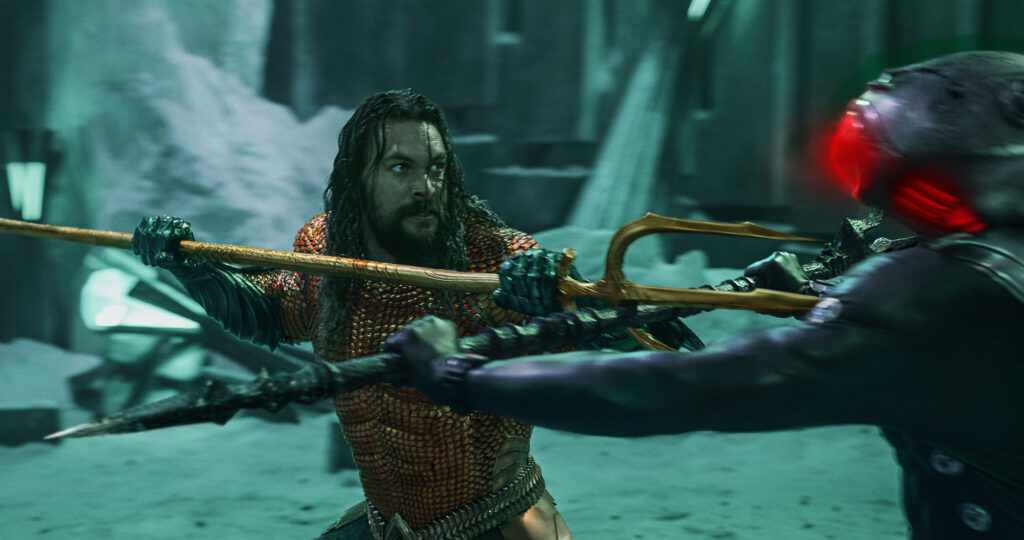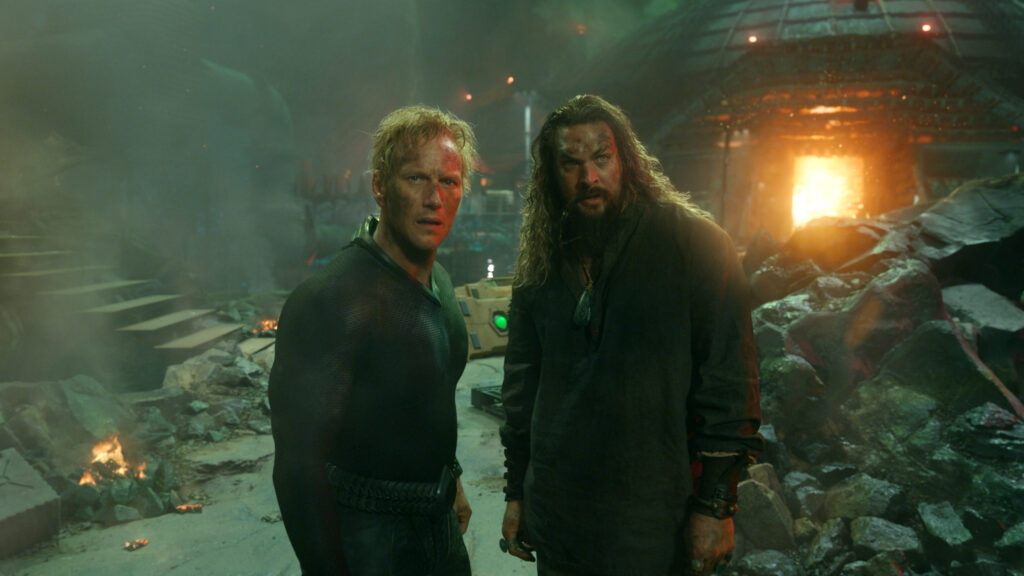December 22, 2023
by Carla Hay

“Aquaman and the Lost Kingdom”
Directed by James Wan
Culture Representation: Taking place above and below the oceans of Earth, the superhero action film “Aquaman and the Lost Kingdom” (based on DC Comics characters) features a racially diverse cast of characters (Asian, white and African American) portraying superheroes and regular human beings.
Culture Clash: Ocean-dwelling superhero Aquaman, also known as Arthur Curry, battles Black Manta, a villain who wants to control the world through environmental terrorism.
Culture Audience: “Aquaman and the Lost Kingdom” will appeal primarily to people who are fans of star Jason Momoa and movies based on DC Comics, but the movie is inferior in every way to its 2018 predecessor, “Aquaman.”

Just like toxic seaweed, “Aquaman and the Lost Kingdom” is a tangled and rotten mess of a superhero film with uneven visual effects, cringeworthy dialogue and a sloppy plot. The filmmakers mistakenly think that Aquaman’s charisma is defined by “surf dude” whooping and hollering. It all becomes very predictable and tiresome, especially when the story is so weak and becomes unnecessarily convoluted in order to stretch the movie’s screen time.
Directed by James Wan and written by David Leslie Johnson-McGoldrick, “Aquaman and the Lost Kingdom” (whose release was delayed multiple times) is supposed to be the last movie in the DC Extendeded Universe (DCEU), which began with 2013’s “Man of Steel,” a Superman origin story. Movies and TV shows based on DC Comics are going through a major overhaul under the leadership of DC Studios co-chairs/co-CEOs James Gunn and Peter Safran, who were appointed to these positions in 2022. The first “Aquaman” movie, released in 2018, is the highest-grossing DC Comics-based movie of all time, with worldwide ticket sales of about $1.15 billion.
Many of the filmmakers behind “Aquaman” are also behind “Aquaman and the Lost Kingdom,” including director Wan, screenwriter Johnson-McGoldrick, producer Rob Cowan, cinematographer Don Burgess, production designer Bill Brzeski, film editor Kirk Morri, music composer Rupert Gregson-Williams and music supervisor is Michelle Silverman. Most of the headlining cast members from “Aquaman” are also in “Aquaman and the Lost Kingdom.” What went wrong?
“Aquaman and the Lost Kingdom” stumbles from the beginning with a corny montage sequence of Arthur Curry/Aquaman (played by Jason Momoa) rescuing a ship that’s being invaded by pirates, and then explaining that he’s now a husband and father who’s the king of the secret underwater kingdom of Atlantis. “That’s right,” Arthur says proudly. “I’m the king of frickin’ Atlantis.”
Arthur likes having this royal title, but he says he hates doing government work that comes with the job, such as attending council meetings, because he doesn’t think it’s any fun. The montage includes Arthur/Aquaman looking like he’s about to fall asleep from boredom at one of these meetings. Aquaman is supposed to be an adult (who looks like a middle-aged human), but he often talks like he’s a teenager who’s become a legal adult and is resentful about having certain adult responsibilities.
Arthur’s wife Mera (played by Amber Heard) gets very choppy film editing in the movie. She’s almost non-existent in the early scenes showing Arthur taking care of baby son Arthur Jr., while Arthur’s supportive father Tom Curry (played by Temuera Morrison) lives in the same household. Adding to the movie’s unimaginative and juvenile comedy, the baby urinates in Arthur’s face more than once in diaper-changing scenes.
At several points in the movie, Arthur looks like he’s a single father, even though he speaks lovingly of his wife, who is nowhere to be seen without explanation when Arthur is spending time with his family. The off-screen controversy over Heard and ex-husband Johnny Depp might or might not have played a role in how Heard is edited in the movie. Many of Depp’s fans petitioned Warner Bros. Pictures to cut her out of the movie because of issues related to the ex-couple’s legal disputes.
Meanwhile, villain David Kane (played Yahya Abdul-Mateen II), who has the alter ego Black Manta, is hell-bent on getting revenge on Aquaman, who was responsible for the death of David’s father in the first “Aquaman” movie. In “Aquaman and the Lost Kingdom,” David is seen scowling while his Black Manta suit is propped nearby. He fumes, “Every day I don’t fix my power suit is another day that Aquaman gets to live.”
David has continued in his father’s profession of being a deep-sea diver who hunts for treasure. He ends up rescuing Dr. Stephen Shin (played by Randall Park), a marine biologist who has survived a deadly attack from a mysterious giant creature with tentacles during an underwater exploration near Antarctica. (“Aquaman and the Lost Kingdom” was actually filmed in Hawaii.) This creature has killed some of the people in Stephen’s team.
Stephen (who is stereotypical science geek character) is grateful to David for saving his life, but it turns out that David is forcing Stephen and the rest of the marine biologist team to work with David. Unbenkownst to Stephen, David has found a magical Black Trident that has allowed David to communicate with this demonic-like creature. The creature has told David: “Free me from my prison, and I will grant you the strength to kill the man who murdered your father.”
This creature is Kordax (played by Pilou Asbæk), the leader of Necrus, which is also called the Lost Kingdom of Atlantis. There are seven kingdoms of Atlantis: Necrus, Atlantis, Xebel, Kingdom of the Fishermen, Kingdom of the Trench, Kingdom of the Brine and Kingdom of the Deserters. David finds out that the Black Trident needs a certain fuel to reach its full power.
Five months later, Arthur/Aquaman appears before the Council of Atlantis, whose leader Karshon (played by Indya Moore) advises him that the people in the surface world have been poisoning the atmosphere of Atlantis through irresponsible environmental pollution. (It has something do with David stealing a stash of orichalcum, a dangerous metal that was locked up in Atlantis.) Arthur thinks it’s time for Atlantis to reveal itself to the people above the water. However, he gets resistance from council members who think that Atlantis should remain a secret from humans.
The rest of “Aquaman” becomes a mishmash of very fake-looking chase/fight scenes, climate change messaging, and a family reunion with a lot of awkward banter. And there’s some nonsense about Curry family blood that gets thrown into the story in a desperate attempt to make the plot look more interesting. For the movie’s action scenes, “loud” and “cluttered” don’t add up to being “exciting” or “interesting.”
The family reunion part of the story involves Arthur’s estranged younger half-brother Orm (played by Patrick Wilson), the former king of Atlantis who was Arthur’s enemy in “Aquaman.” Orm (who also goes by the name Ocean Master) is a dirty, disheveled and emaciated prisoner when Arthur breaks him out of prison to help in the fight against Black Manta and Kordax. But in one of the movie’s phoniest-looking scenes, Orm magically “cleans up” and transforms into a chiseled hunk as soon as he submerges himself in some water on a beach.
Also joining the fray in this family reunion are Atlanna (played by Nicole Kidman), the mother of Arthur and Orm. Atlanna’s regal personality from the first “Aquaman” movie seems to be washed away in “Aquaman and the Lost Kingdom,” which makes her as bland and bland can be. The same can be said for Mera, whose fiery personality has been replaced with being a generic sidekick who helps out in the fight scenes. Mera’s stern father, King Nereus (played by Dolph Lundgren), is also part of Aquaman’s fight team. The main purpose of King Nereus in the movie is to be the person on the team who is most suspicious that Orm will be helpful.
All of these characters would be enough for a superhero movie. But “Aquaman and the Lost Kingdom” doesn’t trust that would be enough to entertain audiences. And so, there are myriads of creatures that populate the movie as distractions that don’t do much to further the plot. Topo, the drum-playing octopus, makes a return to help Aquaman, who doesn’t really want this pet tagging along, but his mother Atlanna insists that Topo accompany Arthur. Arthur/Aquaman acts like a teenager who doesn’t want to babysit the family dog. Kingfish (voiced by Martin Short) is a mutant sea creature who is the sarcastic leader of underwater pirates that have conflicts with residents of Atlantis.
“Aquaman and the Lost Kingdom” has some striking visuals in the Octobots:
vehicles with octopus-like metal arms that are used by Black Manta and his goons. However, even with these inventions and villainous armies doing battle against the heroes, none of it looks truly terrifying during these fight scenes. It all looks very busy, as if the filmmakers thought that throwing up a lot of computer-generated imagery (CGI) on screen is enough to create suspense.
The acting performances in “Aquaman and the Lost Kingdom” go through the motions and aren’t anything special. Momoa looks like he’s trying inject some playful energy into “Aquaman and the Lost Kingdom,” but it just dilutes the action scenes to make Aquaman into a goofball with muscles. It’s similar to how filmmaker Taika Waititi’s version of “god of thunder” Thor in Marvel movies loses the royal aura that the character had in the comic books to become a walking comedy machine that tells jokes that aren’t always funny.
Don’t expect there to be any good mid-credits or post-credits scenes in “Aquaman and the Lost Kingdom.” The mid-credits scene is meant to be amusing, but it will likely nauseate some viewers because it depicts someone eating a cockroach. There is no end-credits scene, which wouldn’t really help anyway, because this movie doesn’t have any story ideas that are fresh or surprising. “Aquaman and the Lost Kingdom” isn’t the worst superhero movie based on DC Comics, but compared to the first “Aquaman” movie, it’s like a crowd-pleasing cruise that has become a shipwreck.
Warner Bros. Pictures released “Aquaman and the Lost Kingdom” in U.S. cinemas on December 22, 2023.


